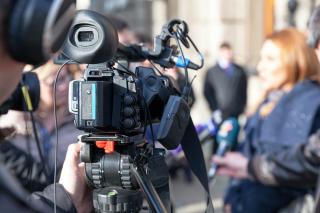Interview edited for length and clarity.
What drew you to the field of communications?
I’ve been experimenting with multimedia arts since I was a teenager. My dad gifted me a Sony Hi8 video camera sometime in the late ’90s, and that was the beginning of my passion for video storytelling. In high school, I excelled in writing with a special interest in journalism, and I looked for a school that could develop these interests into a career.
I grew up in rural Western New York and knew I wanted to go to college in a city. After exploring several options in Boston, Simmons stood out as the perfect fit. It’s a tight-knit and welcoming community set against the backdrop of a vibrant and diverse city — the ideal balance of support and opportunity at that age.
The minor in women’s studies came naturally, as conversations about feminist theory and identity tend to be woven into the academic and social experience at Simmons. "Feminist Film Theory" and "Women in Literature" stand out as particularly foundational courses for me.
How did Simmons prepare you for a career in communications?
I wouldn’t be who I am today creatively without Professor Bob White, with whom I worked both as a teaching assistant (TA) and during an independent study in video production. Bob offered an environment of freedom and mentorship, and gave me incredible space and support to explore video production and editing. Access to video gear and the editing suite was as limitless as Bob’s encouragement.
During my senior year, I was able to intern with WGBH Filmmaker David Sutherland on the PBS series Country Boys and through this experience came a passion for documentary filmmaking. I continued to learn from David after graduation and moved to New York City to pursue a career in documentary production, going on to work on a variety of non-fiction projects.
Since my time at Simmons, I’ve come to appreciate just how flexible and far-reaching my degree truly is. My career has taken me from feature-length documentary filmmaking and freelance editing to corporate marketing, and now to healthcare public relations. Each chapter has built upon the last, reaching back to the foundation I laid at Simmons.
How did attending a women-centered institution impact your education?
A visit to a close friend at Smith College first opened my eyes to how powerful women-centered learning environments can be. I remember talking with her about how rare an opportunity it is to belong to such a space in the span of our lives.
At Simmons, I found an intellectually rich, supportive, and empowering community that challenged me to think critically and speak confidently. We’ve all found ourselves professionally in a room dominated by men, and the confidence I carry feels like a superpower I gained from Simmons. My education there encouraged me to examine how gender and social expectations shape the way we present ourselves in the world.
Did you have a favorite course?
It’s hard to choose just one, but an Op-Ed course with Derrick Jackson, former Simmons professor and journalist for The Boston Globe, stands out. I took the class in the months following September 11, 2001, which was an extraordinary moment in history to be a young person studying politics and opinion writing. Staying engaged with current events and analyzing them through a critical lens was part of the curriculum and became a lifelong habit.
I’d be remiss not to mention journalism class with the late Professor James Corcoran, who was also my trusted advisor, as well as "Death and Dying" with sociology Professor Becky Thompson, a course that introduced me to new ways of thinking about life, loss, and human connection.
Are you still in touch with professors and peer alumnae/i?
I stay in touch with Professor White through social media and make a point to visit him whenever I’m in Boston. After 20 years, the friends I made my freshman year living in Arnold Hall remain those I’m closest to. I’ve attended reunions when I can and always enjoy visiting campus, seeing what’s changed and what still feels the same.
There was even a time when my career brought me back to Simmons in an unexpected way. While working for the architecture firm NBBJ, which was collaborating with Simmons on a master planning project, I had the opportunity to return to campus with a camera to collect data on student perception. That was certainly a full-circle moment for me; my job bringing me back to campus with an opportunity to contribute, in a small part, to the future of Simmons.
What advice would you share with a current student?
Savor your time in school because the time will go by much faster than expected. Those years are foundational to who you are. Take full advantage of every resource available to you, both on campus and in the city. Simmons can be the foundation and testing ground for everything you’re discovering in Boston; let what you learn in the classroom collide with what you experience out in the world.
I remember how often I would take recording gear and experiment as much as possible and test out new software in the communications lab. My professors gave me support as well as autonomy to be creative and make mistakes and triumphs in a safe environment like Simmons.

